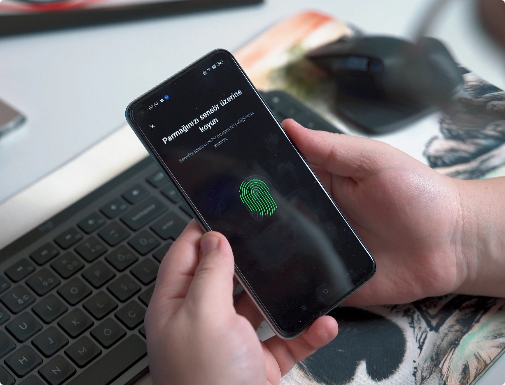Blockchain's
Role in Digital Identity Management
The potential of blockchain technology in digital identity management promises a revolutionary shift from fragmented, insecure, and exclusive traditional systems. Traditionally, identity management systems have relied on centralized databases, making them vulnerable to security breaches and unauthorized access. In contrast, blockchain provides a distributed ledger that records and verifies identity-related transactions in a transparent and immutable manner. This decentralized nature eliminates the need for a single point of control, reducing the risk of fraud and data manipulation.
Blockchain's impact on digital identity management extends to various sectors, including finance, healthcare, and e-commerce. It provides users with greater control and ownership over their personal information. Say goodbye to the hassle of multiple online IDs and passwords, and embrace a future where blockchain-powered digital identities offer a more secure and convenient path forward.

The Digital Identity industry encompasses the systems, technologies, and practices related to the management and verification of individuals' identities in the digital realm. It focuses on establishing and maintaining trust, security, and privacy in online interactions. This industry creates digital versions of our identities that we can use safely for things like logging in, controlling access to information, making online purchases, and getting personalized experiences. It encompasses a wide range of technologies and solutions, such as biometrics, encryption, blockchain, identity verification services, and identity management platforms.
As this industry continues to evolve and adapt to emerging technologies and regulatory requirements, it remains at the forefront of shaping a digital world where individuals can confidently navigate the vast landscape of online interactions with trust and peace of mind.
Industry Challenges with
Blockchain in Digital Identity
The digital identity industry faces significant challenges in terms of data security, privacy, and trust. Blockchain technology offers a promising solution to address these challenges. By leveraging the immutability, transparency, and decentralized nature of blockchain, organizations can enhance digital identity management.
Scalability is a significant challenge in blockchain networks. Currently, these networks have limitations in processing a high number of transactions simultaneously. To enable widespread adoption of blockchain-based digital identity systems, it is crucial to address this scalability issue.
Blockchain can also address identity verification challenges by storing verified identity credentials on the blockchain, streamlining processes such as KYC verification and facilitating secure digital voting systems. Additionally, blockchain-based solutions enhance data security, protect against unauthorized access, and simplify cross-border identity verification.
In addition, there are legal and regulatory challenges that need to be addressed when it comes to implementing blockchain-based digital identity systems. It's important to develop new rules and guidelines that ensure these systems comply with data protection and privacy laws. By doing so, we can ensure that these systems operate in a way that protects user data, respects privacy rights, and follows the necessary legal requirements.
Addressing these challenges is crucial for establishing a secure and legally compliant environment for blockchain-based digital identity systems to thrive.

Where will we see changes in the Digital Identity Industry through blockchain development?
In today's digital landscape, the management of identities is undergoing a transformative revolution. Experts from various fields have expressed their optimism and highlighted the potential of blockchain technology in revolutionizing the digital identity landscape.
The biggest blockchain benefit is security. Apart from cryptocurrency, this technology can be applied for digital identification. Imagine that your passport, driver’s license, health insurance card and Social Security number were all stored in blockchain, with easy access for you only. That could change your experience when you travel, apply for a mortgage, are given a background check for a new job and in other similar scenarios.
- Nadya Knysh
As the digital identity industry embraces blockchain development, we can expect significant changes that will reshape the way we establish, verify, and protect our identities.
- Enhanced Security and Privacy: Blockchain technology revolutionizes digital identity management by providing enhanced security and privacy. By decentralizing data and employing advanced encryption techniques, blockchain minimizes the risk of data breaches and ensures secure storage of personal information.
- Self-Sovereign Identity: With blockchain, individuals gain full control over their personal data and identity. They no longer need to rely on centralized authorities or third-party intermediaries for identity verification.
- Immutable Audit Trails: Blockchain's inherent transparency and immutability create reliable and tamper-proof audit trails for digital identities. These comprehensive identity histories are invaluable for compliance purposes, facilitating dispute resolution, and maintaining an accurate record of identity-related activities.
- Interoperability and Portability: Blockchain-based digital identities offer interoperability and portability across various platforms and services. This eliminates the need for multiple login credentials and simplifies the user experience, allowing individuals to seamlessly access different systems using their blockchain-based identity.
- Streamlined Identity Verification: Blockchain technology simplifies identity verification processes by enabling efficient access to verified data. Instead of relying on time-consuming and manual verification methods, organizations can securely access validated information stored on the blockchain, streamlining the identity verification process.
- Trustworthy Identity Credentials: Blockchain facilitates the secure storage and verification of digital credentials, such as degrees, certifications, and licenses. By leveraging blockchain technology, individuals can securely present their digital credentials, eliminating the risks of forgery and providing a trusted mechanism for verifying qualifications and achievements.
SERVICES
Global Digital Identity Solutions for Secure Digital Interactions
Revolutionize the healthcare industry by implementing blockchain-based identity solutions. For instance, patients can securely access their medical records from any healthcare provider globally, ensuring accurate diagnoses and seamless continuity of care.
Empower businesses with blockchain for employee verification, skill development validation, and issuance of tamper-proof IDs. For example, a global consulting firm can verify the expertise of its remote workforce through blockchain-based credentials, promoting trust and enabling efficient talent management.
Enhance supply chain management across industries by leveraging blockchain for identity verification and data security. For instance, a global retail brand can track the origin of its products, ensuring authenticity and preventing counterfeiting by integrating blockchain identities into their supply chain ecosystem.
Governments can enhance trust and transparency by issuing blockchain-based identities and licenses. For example, citizens can access digital identities stored on a blockchain, facilitating secure interactions with government agencies and simplifying processes like license renewal or online voting.
Embrace the power of verifiable credentials for licenses and training certifications, leveraging blockchain technology. For instance, a professional certification organization can issue digital credentials on a blockchain, allowing employers to instantly verify the qualifications of job applicants.
Drive digital identity development in the financial services sector through blockchain innovation. For instance, a fintech company can offer decentralized digital identity solutions for seamless customer onboarding, eliminating the need for manual document verification and reducing fraud risks.
SERVICES
How does Blockchain add value to the Digital Identity Solutions?
Reliable and Transparent Records
Blockchain creates an unchangeable record of identity transactions, ensuring reliable and verifiable information for trust and transparency.
Control over Your Identity
With blockchain, you have the power to control who can access your information and for what purposes, giving you control over your privacy and selective data sharing.
Trustworthy and Consistent Data
Blockchain uses advanced algorithms to ensure accurate and consistent identity data, minimizing errors and discrepancies.
Data Ownership and Monetization
Blockchain allows individuals to retain ownership of their identity data, giving you the authority to decide how it's shared or monetized, preventing unauthorized use.
Cross-Border Identity Verification
Blockchain enables seamless and secure identity verification across borders, simplifying international transactions and removing complexities associated with different identity systems.


The global Digital Identity Solutions market is on a significant growth trajectory, with a projected CAGR of 15.53% during the forecast period. By 2027, the market is expected to reach a value of USD 52,128.77 million, compared to USD 21,919.95 million in 2021. This growth is attributed to various factors, including expanding governmental initiatives for blockchain technology development, both in developed and emerging countries.
Currently, North America dominates the blockchain identity management market, thanks to its advanced infrastructure and technological advancements. As more merchants prioritize data security, the demand for enhanced solutions increases.
Exciting developments are already underway, showcasing the potential of blockchain technology in enhancing digital identity solutions:
- Deloitte Switzerland is integrating Polkadot's KILT blockchain technology for issuing reusable digital credentials to support KYC and KYB processes.
-Scantrust and Cardano Africa are exploring digital identity solutions using Cardano's blockchain platform. Scantrust focuses on secure supply chain solutions, while Cardano Africa aims to provide access to digital identity and finance in Africa.
- According to Aravind Srimoolanathan from Frost & Sullivan, blockchain technology will integrate with biometrics by 2030, leading to the establishment of a single-token digital identity for individuals.
With blockchain's tamper-proof and decentralized nature, the future of digital identity is poised to offer enhanced security, privacy, and accessibility. This integration holds the potential to revolutionize various sectors, including finance, healthcare, and supply chain management, paving the way for a more trusted and seamless digital identity experience.
How Codezeros Drives Innovation in Digital Identity Development?
At Codezeros, we have collaborated with numerous organizations, understanding their unique requirements for digital identity solutions. Our approach revolves around prioritizing security, privacy, and user empowerment. Through our expertise and innovative mindset, we have developed cutting-edge solutions that address the evolving challenges in the digital identity landscape.
Additionally, we understand the complexities of identity management systems and the importance of compliance with regulatory requirements. Our team stays updated with the latest advancements in the digital identity space, including decentralized identity (DID) frameworks, self-sovereign identity (SSI), and identity verification protocols.
We also have proficiency in integrating digital identity solutions with existing systems and applications, ensuring seamless interoperability and a smooth user experience. Our expertise extends to areas such as identity proofing, authentication mechanisms, access control, and data privacy.
With our comprehensive skill set and industry knowledge, Codezeros is well-equipped to deliver innovative digital identity solutions that address the unique challenges and requirements of the industry. We are committed to providing secure, privacy-enhancing, and user-centric solutions that empower individuals and organizations in the digital world.
References
1.
Blockchain for Digital Identity | Real World Blockchain Use Cases | ConsenSys
https://consensys.net/blockchain-use-cases/digital-identity/Nigeria2.
Nigeria goes blockchain: Policy could impact digital identity (cointelegraph.com)
https://www.digitaljournal.com/pr/news/theexpresswire/digital-identity-solutions-market-2023-is-set-to-fly-excessive-growth-in-years-to-come3.
Digital Identity Solutions Market 2023 Is Set to Fly Excessive Growth in Years to Come
https://analyticsindiamag.com/is-npci-building-single-token-digital-identity/4.
16 Tech Experts Share Blockchain’s Potential Outside The Finance Industry (forbes.com)
16 Tech Experts Share Blockchain’s Potential Outside The Finance Industry (forbes.com)INDUSTRIES
Industry Solutions through Blockchain development
Explore how the industry 4.0 functionalities have revolutionized with the added layer of blockchain technology.

The most common questions
We recognize that you may have questions, and to ensure you have the information you seek, we have curated a list of some common questions.











